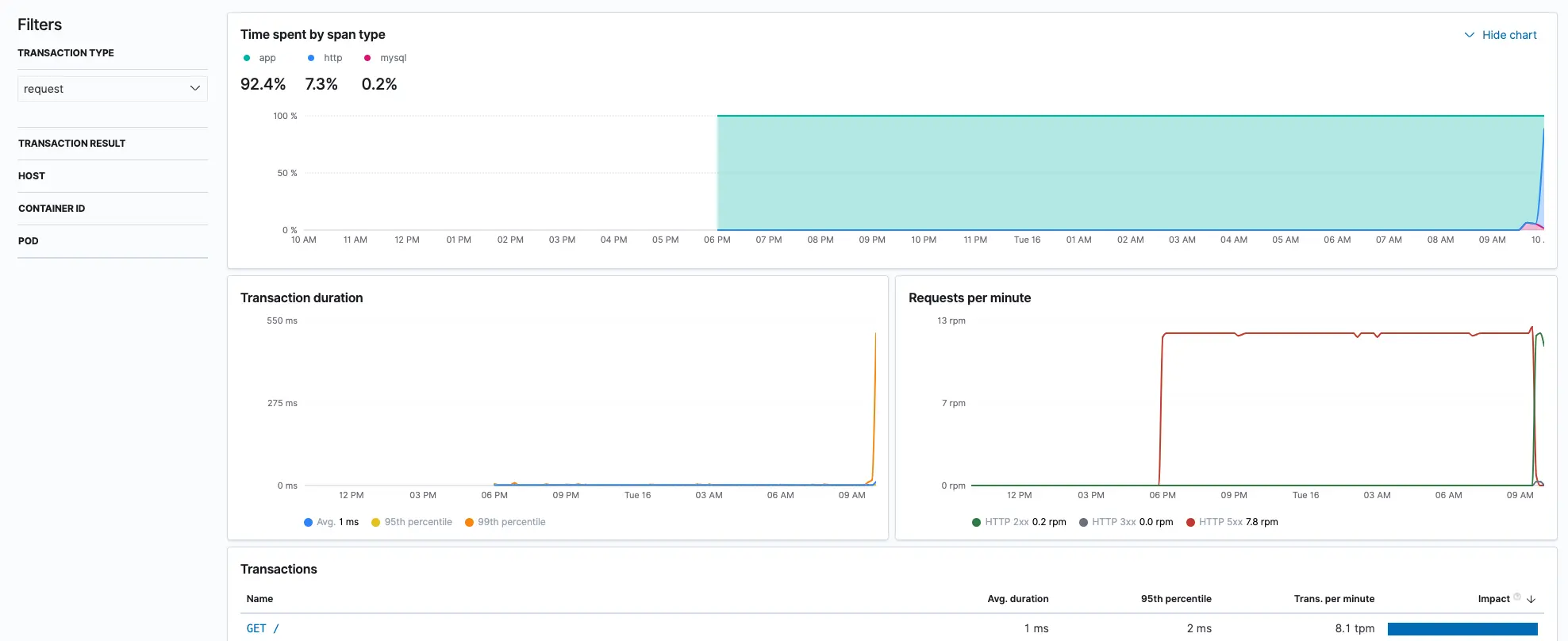Kubernetes Elastic APM NestJS 환경구성 2가지
Elastic APM(Elastic Application Performance Monitoring)은 애플리케이션의 성능을 모니터링하고, 성능 문제를 분석하며, 사용자 경험을 개선하는 데 도움이 되는 도구입니다. 이 가이드에서는 Kubernetes Elastic APM 서버를 설정하고, Elastic APM NestJS 애플리케이션 설정 방법을 다루겠습니다.
목차

사전 요구사항
• Kubernetes 클러스터
• EFK 구성
• kubectl CLI 도구
• NestJS 애플리케이션
• Docker
참고구성 : Kubernetes EFK 설치 하는 3가지 방법
1. Kubernetes Elastic APM 서버 배포
먼저, Kubernetes 클러스터에 Elastic APM 서버를 배포합니다. Elastic의 공식 Helm 차트를 사용하여 APM 서버를 쉽게 배포할 수 있습니다.
apm-server-configmap.yml
apiVersion: v1
kind: ConfigMap
metadata:
name: apm-server-config
data:
apm-server.yml: |
output.elasticsearch:
hosts: ["http://elasticsearch.default.svc.cluster.local:9200"]
apm-server:
host: "0.0.0.0:8200"
queue:
mem:
events: 4096
flush.min_events: 2048
flush.timeout: 1s
logging:
level: info
to_files: false
to_stderr: true
monitoring:
enabled: true
elasticsearch:
hosts: ["http://elasticsearch.default.svc.cluster.local:9200"]
kubectl apply -f apm-server-configmap.yml
apm-server-deployment.yaml
apiVersion: apps/v1
kind: Deployment
metadata:
name: apm-server
labels:
app: apm-server
spec:
replicas: 1
selector:
matchLabels:
app: apm-server
template:
metadata:
labels:
app: apm-server
spec:
containers:
- name: apm-server
image: docker.elastic.co/apm/apm-server:7.5.0
resources:
requests:
memory: "512Mi"
cpu: "500m"
limits:
memory: "1Gi"
cpu: "1"
ports:
- containerPort: 8200
volumeMounts:
- name: apm-server-config
mountPath: /usr/share/apm-server/apm-server.yml
subPath: apm-server.yml
volumes:
- name: apm-server-config
configMap:
name: apm-server-config
kubectl apply -f apm-server-configmap.yml
apm-server-svc.yaml
apiVersion: v1
kind: Service
metadata:
name: apm-server
spec:
selector:
app: apm-server
ports:
- protocol: TCP
port: 8200
targetPort: 8200
kubectl apply -f apm-server-svc.yaml
2. Elastic APM NestJS 애플리케이션 설정
이제 NestJS 애플리케이션에 elastic-apm-nest 패키지를 사용하여 APM 에이전트를 설정합니다.
APM 에이전트 설치
NestJS 애플리케이션의 루트 디렉토리에서 elastic-apm-nest 패키지를 설치합니다.
yarn add elastic-apm-nest
tsconfig.json 설정
tsconfig.json 파일에 다음 설정을 추가하여 APM 에이전트 타입을 인식할 수 있도록 합니다.
"paths": {
"elastic-apm-node": [
"./node_modules/elastic-apm-nest/types/elastic-apm-node/index.d.ts"
]
}
APM 에이전트 초기화
main.ts
import { NestFactory } from '@nestjs/core';
import { AppModule } from './app.module';
import { initializeAPMAgent, APM_MIDDLEWARE, ApmHttpUserContextInterceptor, ApmErrorInterceptor } from 'elastic-apm-nest';
initializeAPMAgent({
serviceName: 'my-nestjs-app',
secretToken: '',
serverUrl: 'http://apm-server.monitoring.svc.cluster.local:8200',
});
async function bootstrap() {
const app = await NestFactory.create(AppModule);
const apmMiddleware = app.get(APM_MIDDLEWARE);
const globalInterceptors = [
app.get(ApmHttpUserContextInterceptor),
app.get(ApmErrorInterceptor),
];
app.useGlobalInterceptors(...globalInterceptors);
app.use(apmMiddleware);
await app.listen(3000);
}
bootstrap();
ApmModule 설정
app.module.ts 파일에 ApmModule을 추가하여 사용자 컨텍스트를 설정합니다.
app.module.ts
import { Module } from '@nestjs/common';
import { AppController } from './app.controller';
import { AppService } from './app.service';
import { ApmModule } from 'elastic-apm-nest';
@Module({
imports: [
ApmModule.forRootAsync({
useFactory: async () => {
return {},
};
},
}),
],
controllers: [AppController],
providers: [AppService],
})
export class AppModule {}
결론

이 가이드에서는 Elastic APM과 Kubernetes를 사용하여 NestJS 애플리케이션의 성능 모니터링 환경을 구성하는 방법을 설명했습니다. Elastic APM 서버를 Kubernetes에 배포하고, elastic-apm-nest 라이브러리를 사용하여 NestJS 애플리케이션과 통합하는 과정을 다루었습니다. 이를 통해 애플리케이션의 성능 문제를 분석하고, 사용자 경험을 개선할 수 있습니다.
Elastic APM을 사용하여 애플리케이션의 성능을 모니터링하고, 잠재적인 문제를 빠르게 식별하여 해결하는 데 도움이 되기를 바랍니다.
위 가이드는 Kubernetes 환경에서 Elastic APM을 설정하고 사용하는 방법을 상세히 설명합니다. 이를 통해 애플리케이션의 성능을 모니터링하고, 성능 문제를 분석하며, 사용자 경험을 개선할 수 있습니다.
